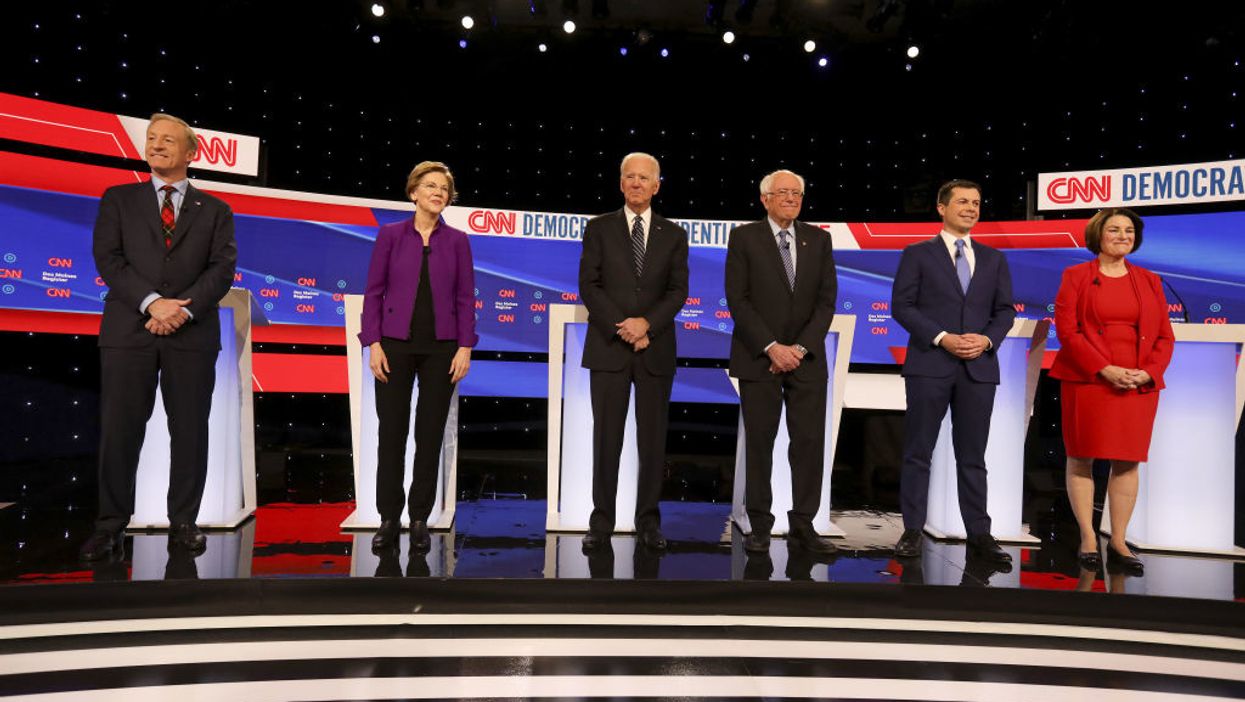
Daniel Acker/Bloomberg via Getty Images

After a year of campaigning, Iowa finally votes
After roughly a year of campaigning, the first official votes of the 2020 Democratic presidential primary will be cast Monday night in the much-anticipated Iowa caucuses, with 41 pledged delegates up for grabs.
The big storyline heading into the contest is the unexpected surge of Sen. Bernie Sanders (I-Vt.), who appears, for now at least, to be the clear leader in the state.
The RealClearPolitics polling average shows Sanders atop the field with 23% of the vote, former Vice President Joe Biden trailing behind him with 19.3%, former South Bend, Indiana, Mayor Pete Buttigieg sitting in third with 16.8%, Sen. Elizabeth Warren (D-Mass.) in fourth with 15.5%, and Sen. Amy Klobuchar (D-Minn.) in fifth with 9%.
The remaining 6 candidates are polling in the low single digits and are not considered to be threatening a top three finish in the contest.
Sanders, who was trailing Biden by 4 points as recently as two weeks ago, rapidly emerged as the front-runner in the final days before the caucuses.
His surge has not only shocked the Biden campaign, but also came at the direct expense of fellow progressive candidate, Elizabeth Warren. Warren and Sanders share viewpoints ideologically and both occupy the more progressive wing of the Democratic Party. As a result, as Sanders polling numbers have risen, Warren has seen hers plummet in the weeks leading up to the caucuses.
Another notable trend in recent polls is the rise of Pete Buttigieg. A brand-new poll, conducted by the Democratic group Focus on Rural America, released results Monday showing Buttigieg in the lead with 19% of the votes, and Sanders trailing behind at 17%.
Republicans may not immediately appreciate the significance of Iowa's Democratic caucuses, due to the state's lesser significance in their own party's nominating contest. But while Iowa is usually not an accurate predictor of who the Republican nominee will be, in recent years, it as been an accurate predictor of the eventual Democratic nominee.
In the last four elections, the candidate who won Iowa has gone on to win the Democratic nomination.
This is why so many Democrats are concerned about recent polling coming out of Iowa and New Hampshire showing Sanders with the lead. Democrats who believe that Biden, the current national front-runner, gives them the best chance to defeat President Trump in next year's election are worried that Sanders will pick up steam with wins in Iowa and New Hampshire and run away with the nomination.
Biden surrogate and former Secretary of State John Kerry was even overheard discussing the possibility of entering the race amid concern over "Bernie Sanders taking down the Democratic Party."
Each election is its own story, however, and there are no guarantees that Sanders will take the nomination even with wins in early states. With this in mind, the Biden campaign is already downplaying Iowa results.
"We view Iowa as the beginning, not the end," Biden adviser Symone Sanders said Sunday, according to Axios.
Even if winning Iowa is not the end-all be-all, however, a respectable finish there is paramount for Biden. It would be difficult for the national front-runner to hold on to that status with a dismal performance Monday night.
For decades, the Iowa caucuses have been decided by the apportionment of delegates, operating similarly to the way the Electoral College does except on a state level, but the popular vote totals were not released to the public. This year, that all changes.
According to the Des Moines Register, on Monday, "the Iowa Democratic Party will publish the raw vote totals from each precinct showing how many people supported each candidate on the first and final alignments."
The Iowa caucuses operate much differently than other states' nominating processes. In Iowa, voters go to local caucus sites, such as churches or high school gyms, and gather in different areas with other voters who support the same candidate. This initial gathering is called the first alignment, and this year, those totals will be published.
After the initial alignment, voters who support candidates that fail to meet a certain threshold have the opportunity to either convince other voters to join their group or join another candidate's group. At this point another tally is taken in what is called the final alignment, and delegates are awarded to candidates proportionally. Those totals will also be published.
The Des Moines Register notes that these new rules could "allow the campaigns to spin the results in a multitude of new ways, potentially hijacking the media narrative and claiming momentum out of Iowa."
For more on this and how Iowa's caucuses could potentially result in multiple winners, read this article by FiveThirtyEight.